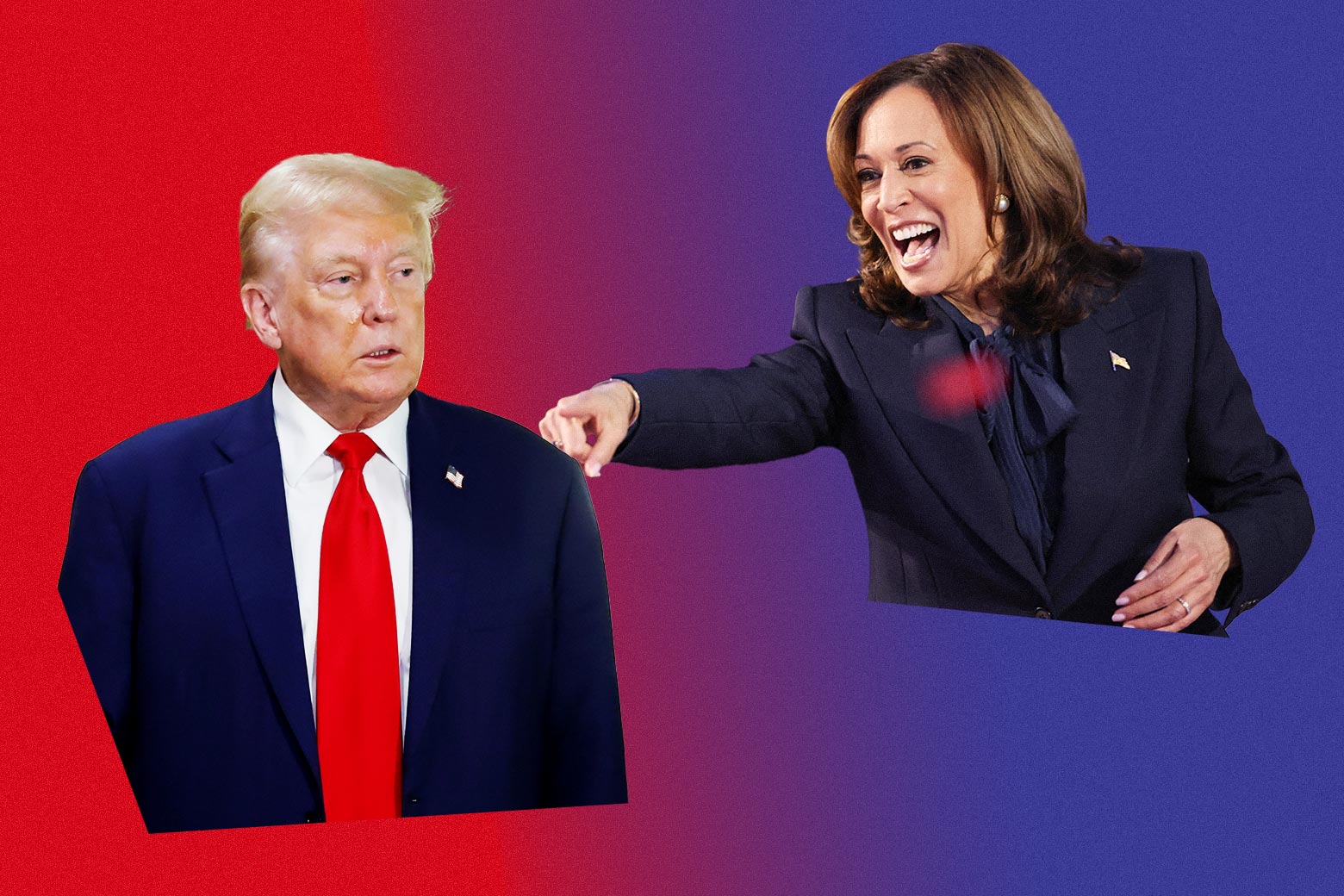As Kamala Harris spoke on the last night of the Democratic National Convention, Donald Trump took to Truth Social to ask, “IS SHE TALKING ABOUT ME?” Even for a man notorious for deranged tweets, this was an all-timer. Trump is easily triggered, easily sent into angry spirals, easily knocked off-kilter by a light press of his emotional buttons, but Harris seems to push him into the fully unhinged.
That particular social media spree is hardly the only example of the former president melting down over his new opponent. Trump has questioned whether Harris is really Black. He has mocked her laugh. He appears particularly upset by the idea that the crowds gathering to see her are larger than his, so he suggested that she was using A.I. to fake the number of her fans. (She wasn’t.) As she delivered her remarks at the DNC, he posted, “WHERE’S HUNTER?” He tried to go after her running mate, Tim Walz, insisting: “Walz was an ASSISTANT Coach, not a COACH.” As Harris’ speech went on and Trump unraveled further, he did what he often does when he wants to vent: He called in to Fox News. During the 10-minute phone interview, he ranted and rambled and seemed to be accidentally pressing various buttons on his phone, punctuating the broadcast with random beeping—that is, until he was ultimately cut off.
When it comes to Harris, the man once known as “Teflon Don” is suddenly struggling to make his insults and accusations stick. Trump has long channeled his bad feelings into ridiculing and demeaning anyone who challenges him, often with derisive nicknames; his target list has included plenty of Republicans too. But some people appear to get under his skin more than others. One politician he seems to truly despise is Barack Obama, whom Trump targeted with the ugly and false “birther” claim that Obama was born not in the United States but rather in Kenya, the homeland of his father. Even after those claims were disproved again and again, Trump persisted. When Obama turned the tables and made fun of Trump and his birther conspiracies at the 2011 White House Correspondents’ Dinner, Trump was visibly steamed. Many in politics and media believe that that moment—that particular humiliation—is why Trump ran for president in 2016.
Trump clearly reviled his opponent in that race, Hillary Clinton. At this point, we know quite a bit about why Trump’s 2016 campaign was so startlingly successful, and much of it boils down to racism, sexism, and white voters’ fears of a changing country and their own declining status. While many Americans saw a Black president as a sign of progress, for many others Obama was symbolic of the unseating of white power in America. The prospect of a woman following a Black man into the White House torpedoed many white male voters into a state of extreme anxiety and resentment: The end of male domination in politics (not to mention workplaces, popular culture, and so on) indicated that white men were being unjustly booted from their rightful thrones, rather than that centuries of inequality were evening out.
It’s impossible for any of us to know what goes on in Trump’s head or heart, but he certainly comes across as animated by similar anxieties and resentments. A Black president made him legitimately angry. The specter of a female one coming on the heels of a Black man made him even more enraged. Trump is a man who expects women to be performatively beautiful and little else—see, for example, his Miss Universe pageant, his array of wives, his affairs, his ugly habit of insulting women for their looks. (The one exception seems to be his daughter Ivanka, who is perhaps in a special category because he sees her as an extension of himself.) His incensed and bitter fans believe not just that Trump speaks for them; they believe that he is with them.
Trump mocked Joe Biden too, usually for being old and slow, complained about his policies, and blamed him for alleged border chaos and economic woes. But Trump rarely appeared enraged by Biden’s very existence the way he has been with Obama, Clinton, and now Harris. And what is it about Joe Biden that is different from Barack Obama, Hillary Clinton, and Kamala Harris?
You know the answer, but just in case: Every American president in the country’s centurieslong history has been a white man, with one single exception. Obama is Black; Clinton is a woman; and Harris is Black, Indian, and a woman. Trump, like so many of his followers, seems to believe that there is a natural order to the world and that in it, white men are the deserved leaders. A change to this order isn’t a correction but a dangerous perversion. Even while Trump griped that the election had been stolen from him (it hadn’t), one never got the sense that he felt as if Biden was an unnatural interloper; rather, he blamed the “deep state” and a whole political machine that he claims stripped him of his rightful win. When it comes to adversaries who are not white and male, though, the Trumpian starting point is that they don’t even deserve to be in the ring.
The current levels of energy and enthusiasm for Harris no doubt compound this sense of aggrieved entitlement. Masses of fervent followers were supposed to be Trump’s thing; it’s unfathomable to him that Harris’ crowds might be larger than his. Harris is also capturing the attention of the media and the public; Trump thrives on attention and lashes out when he feels deprived of it. Biden is many things—competent, steady, likable—but he is not a person who whipped up any great passion among his supporters. Trump was—and now so is Harris. And while Harris’ shiny new campaign and the exuberance it brings make headlines, Trump’s campaign is feeling stale, his events filled mostly with die-hards. Recent news stories revolve around various flubs and failures. His running mate, J.D. Vance, is worse than a dud. He’s a liability. Harris has been so successful in mobilizing voters who favor abortion rights that Trump is now claiming that he too will protect reproductive rights for American women—after spending his first term appointing the Supreme Court justices who stripped those rights away. Up until now, his campaign was boasting about how he helped overturn Roe v. Wade.
Trump’s attempts to smear Harris and Walz have fallen universally flat. That flatness comes in part because we’ve now been hearing the same tune for eight years, as Trump raves and rambles about those he believes not only have wronged him but are ruining America. And it’s not just the content that seems tired; it’s the man himself. Trump has receded into the right-wing echo chambers of Truth Social and conservative cable news and surrounded himself with nutcase true believers and MAGA fanatics. His insults feel less on the nose, and his social media rage posts are less funny, perhaps because he has lost touch with how people feel outside the far-right fringe. In 2016 he was the “right-wing uncle who annoys everyone at Thanksgiving but makes for good stories.” These days, he’s more the “disturbed and declining grandpa who won’t leave his recliner and has us all vaguely concerned but mostly trying not to get involved.” He understands that Harris is outperforming him on the trail and running a much more vigorous campaign than he is; not only is he incensed about it, but he seems to legitimately not understand why other people like her. After all, solely by virtue of her race and gender, she is a person who Trump believes cannot be great.
In 2016 Trump touched on something largely invisible to the college-educated city dwellers who fill the ranks of mainstream U.S. media: the deep sense of displacement among many white voters (especially white male voters without college degrees) that came along with seeing the white male monopoly on power decline in real time. But for the past eight years, as white male power in the White House has been restored, Trump has grown increasingly out of touch. A fading Democratic nominee was replaced by a dynamic one. Suddenly, Trump seems less like a guy who has his finger on the pulse of an unseen America and more like a man whose own once-pounding vigor has curdled—and who cannot conceal his rage at a brighter, fresher opponent who embodies all the change that he knows will mark his demise. That’s why he’s so angry.














